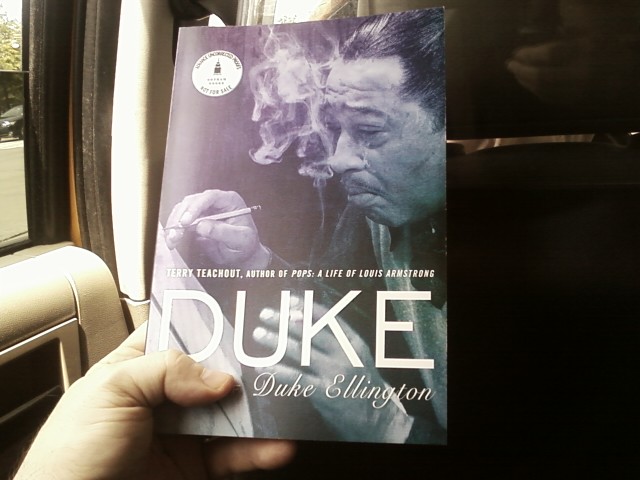John Douglas Thompson just got the nod from the Connecticut Critics Circle as outstanding actor in a play. The show in question was Satchmo at the Waldorf, my first play, which was produced at New Haven’s Long Wharf Theatre last year. Bravo, dear friend and colleague!
For more information about this year’s other awards, go here.
Archives for May 2013
TT: Same as the old boss
In today’s Wall Street Journal I review two major revivals in New York and Chicago, Classic Stage Company’s The Caucasian Chalk Circle and the Court Theatre’s The Misanthrope. Both are superior. Here’s an excerpt.
* * *
Bertolt Brecht was a bad man who was also a great artist, and the play in which it is most difficult to attend exclusively to his greatness is “The Caucasian Chalk Circle.” First produced in East Berlin in 1954, “The Caucasian Chalk Circle” is a complex and mysterous fable of justice and its discontents that is prefaced by a strident prologue set on a collective farm in which Brecht, who was famously enamored of Soviet Communism, assures the audience that “the home of the Soviet people shall also be the home of Reason!” How can those who know of Stalin’s murderous proclivities bridge the gap between propaganda and parable? Should we even try?
 Brian Kulick has “solved” this problem cleverly–if evasively–in Classic Stage Company’s revival of “The Caucasian Chalk Circle.” Not only has he cut the prologue, but he’s moved the action forward to 1989, immediately after the collapse of Communism. The premise of the production is that “The Caucasian Chalk Circle” is being performed by a poverty-stricken troupe of strolling players who now realize that the result of the Russian Revolution was “to make it possible for the most evil people to have the most power.” While this confession, presumably penned by Mr. Kulick himself, is spoken not in English but in untranslated Russian, it’s plain to see what’s going on, since the centerpiece of Tony Straiges’ set is a statue of Lenin that is pulled off its pedestal and smashed to bits as the show gets underway.
Brian Kulick has “solved” this problem cleverly–if evasively–in Classic Stage Company’s revival of “The Caucasian Chalk Circle.” Not only has he cut the prologue, but he’s moved the action forward to 1989, immediately after the collapse of Communism. The premise of the production is that “The Caucasian Chalk Circle” is being performed by a poverty-stricken troupe of strolling players who now realize that the result of the Russian Revolution was “to make it possible for the most evil people to have the most power.” While this confession, presumably penned by Mr. Kulick himself, is spoken not in English but in untranslated Russian, it’s plain to see what’s going on, since the centerpiece of Tony Straiges’ set is a statue of Lenin that is pulled off its pedestal and smashed to bits as the show gets underway.
What follows is a straightforward yet sensitive rendering of “The Caucasian Chalk Circle” that is enacted with lively simplicity…
Nobody needs to make a case for “The Misanthrope,” but Charles Newell, artistic director of the Court Theatre, has done something equally ingenious with Molière’s satirical masterpiece: He’s come up with a high-concept production devoid of the this-means-that rigidity that is too often the curse of such updated versions.
In Mr. Newell’s staging of Richard Wilbur’s immaculately lucid verse translation of “The Misanthrope,” virtually all of the characters save for Alceste (Erik Hellman), the reflexively tactless anti-hero, are played by black or biracial actors. I doubt I need to tell you how that could have worked out in practice, but Mr. Newell has developed his defining idea in a way that is not schematic but supple. Instead of banging the audience over the head with the obvious fact that Alceste is white, Mr. Newell offers it up as a given and lets us decide for ourselves what it means. Is Alceste a traditionalist at sea in the disorienting world of modernity? That’s my reading, but nothing about Mr. Newell’s staging demands that you agree with me–or, indeed, draw any definitive conclusion as to what he has in mind–and the ambiguity that results is not indecisive but stimulating….
* * *
Read the whole thing here.
A scene from the Court Theatre’s production of The Misanthrope:
TT: Almanac
“‘Ye know a lot about it,’ said Mr. Hennessy. ‘I do,’ said Mr. Dooley. ‘Not bein’ an’ author I’m a gr-reat critic.”
Finley Peter Dunne, “On the Bringing Up of Children”
TT: So you want to see a show?
Here’s my list of recommended Broadway, off-Broadway, and out-of-town shows, updated weekly. In all cases, I gave these shows favorable reviews (if sometimes qualifiedly so) in The Wall Street Journal when they opened. For more information, click on the title.
BROADWAY:
• Annie (musical, G, reviewed here)
• Matilda (musical, G, all performances sold out last week, reviewed here)
• The Nance (play with music, PG-13, closes Aug. 11, reviewed here)
• Once (musical, G/PG-13, most performances sold out last week, reviewed here)
• The Trip to Bountiful (drama, G, closes Sept. 1, reviewed here)
• Vanya and Sonia and Masha and Spike (comedy, PG-13, remounting of off-Broadway production, closes July 28, original production reviewed here)
OFF BROADWAY:
• Avenue Q (musical, R, adult subject matter and one show-stopping scene of puppet-on-puppet sex, reviewed here)
• The Fantasticks (musical, G, suitable for children capable of enjoying a love story, reviewed here)
• The Weir (drama, PG-13, closes July 7, reviewed here)
CLOSING SUNDAY IN WASHINGTON, D.C.:
• Coriolanus (Shakespeare, G/PG-13, reviewed here)
TT: Almanac
“There is no more unfortunate creature under the sun than a fetishist who yearns for a woman’s shoe and has to settle for the whole woman.”
Karl Kraus, Beim Wort Genommen (trans. Harry Zohn)
TT: Surprise package
 I walked into the downtown offices of Gotham Books this afternoon with the corrected first-pass page proofs of Duke: A Life of Duke Ellington tucked under my arm. Emily Wunderlich met me at the elevator with a big grin on her face and the first copy of the advance uncorrected proofs of Duke in her hand, hot off the press.
I walked into the downtown offices of Gotham Books this afternoon with the corrected first-pass page proofs of Duke: A Life of Duke Ellington tucked under my arm. Emily Wunderlich met me at the elevator with a big grin on her face and the first copy of the advance uncorrected proofs of Duke in her hand, hot off the press.
Advance uncorrected proofs, usually referred to by authors as “bound galleys,” are the bound volumes that are sent out to editors and reviewers a few months prior to the publication of a new book. They look like trade paperbacks–or, to put it another way, like actual books. Until this afternoon, Duke consisted first of images on a computer screen, then a stack of printed-out pages. Now it’s a physical object.
Emily gave me the bound galleys. “What do you think?” she asked.
“Holy shit!” I blurted. “It’s real! And it’s beautiful!”
“It sure is,” she said.
I went home happy.
TT: The moment of truth
 I finished correcting the first-pass page proofs of Duke: A Life of Duke Ellington at one-thirty this morning. After I deliver the pages to Emily Wunderlich of Gotham Books later today, I’ll no longer be able to make any more changes to the text of Duke for any reason short of criminal libel or flagrant misspelling. Unless I should feel moved to make a final fix or two en route to Gotham, that’s all he wrote.
I finished correcting the first-pass page proofs of Duke: A Life of Duke Ellington at one-thirty this morning. After I deliver the pages to Emily Wunderlich of Gotham Books later today, I’ll no longer be able to make any more changes to the text of Duke for any reason short of criminal libel or flagrant misspelling. Unless I should feel moved to make a final fix or two en route to Gotham, that’s all he wrote.
Needless to say–I hope–I’ve done my damnedest to ensure that Duke contains no factual or typographical errors of any kind. Alas, the fact that I corrected one niggling little typo and a handful of oh-God-I-can’t-believe-I-got-that-date-wrong mistakes during my final editing pass served as a scary but usefully humbling reminder that no biographer is perfect. (No, I won’t tell you what they were. Only my friend Steven Lasker, who gave Duke an additional last-minute fact-checking read, knows the terrible truth, and he’s not telling.) All we can do is work as hard as we can and hope for the best thereafter, and that’s what I’ve tried to do.
So…here I come, Emily! Take good care of my baby!
* * *
Duke Ellington performs “C Jam Blues” in 1941:
TT: Snapshot
Vladimir Horowitz plays Scriabin’s Vers la flamme in his New York apartment:
(This is the latest in a series of arts-related videos that appear in this space each Monday and Wednesday.)
